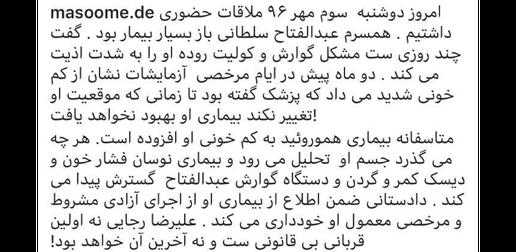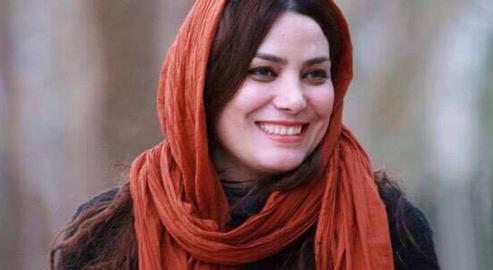“Alireza Rajaei is not the first victim of injustice, nor the last,” wrote Masoumeh Dehghan, the wife of the imprisoned human rights lawyer Abdolfatah Soltani, on her Instagram page on September 25.
Abdolfatah Soltani has been in Evin Prison’s Ward 350 since September 10, 2011. Judge Yahya Pir Abbasi of Branch 28 of the Revolutionary Court sentenced him to 18 years in prison for “co-founding the Defenders of Human Rights Center” with Nobel Peace winner Shirin Ebadi, “being awarded the [2009] Nuremberg International Human Rights Award,” and “giving interviews to the media about his clients’ cases.” His sentence was later reduced to 13 and then 10 years.
Deghan reported that her husband was suffering from a colon ulcer and hemorrhoids.
“Last Monday while visiting him, the family noticed that my father is not doing very well,” his daughter Maedeh Soltani told IranWire. “My father usually does not talk about his physical condition but my mother, who knows about his illness, noticed that he was in a bad physical condition because he was impatient and weak. When the family asked him about his health, he said that in the past few days he had been suffering from severe digestive problems.”
His daughter believes his colon ulcer is a consequence of his time in prison — and says doctors have agreed. “Doctors have repeatedly said that his ulcer is a result of conditions in prison and as long he lives under these conditions there is little chance he will recover,” she says. “Since 2007, when he was serving his previous prison sentence, he has been suffering from hemorrhoids and because of the loss of blood due to this illness, sometimes he suffers from anemia as well.”
Between serving his two prison terms, Abdolfatah Soltani underwent several medical tests. Each time his doctors confirmed that he suffers from anemia and needed treatment. His daughter says that he has developed resistance to drugs and the only way for him to recover is to leave prison.
Blatant Violation of the Law
Although Abdolfatah Soltani is legally eligible for parole, judiciary officials have resisted granting him parole. “Every day that my father spends in prison is a blatant violation of the law,” says Maedeh Soltani. “On one hand, he is eligible for parole. But on the other hand, they have sent his case for judicial review, but the case has not been reopened. Keeping him in prison despite all those articles and provisions of the law that argue he should be released shows that they are willfully trying to keep him in prison at any price. If the case is reopened and reviewed, they will discover that he has been in prison for so many years for no reason at all.”
When Abdolfatah Soltani received a 10-year sentence for “co-founding the Defenders of Human Rights Center,” he had already spent seven months in prison on the same charge. After spending a long time in solitary confinement he was tried, acquitted from the charge and then released. “Many lawyers have told us that since my father had already been tried on that charge and the case was closed, the second verdict is against both the law and sharia and his imprisonment is illegal,” his daughter says. “But every time my mother goes to the prosecution they say that this is outside their authority and everything is decided by the bailiffs. But this claim is not legal, either.”
Maedeh Soltani says that the medical condition of journalist Alireza Rajaei, who recently underwent surgery to remove part of his jaw and one of his eyes after medical neglect while in prison, has been a source of sadness. And this sadness has become worse knowing that there are other prisoners of conscious suffering poor health in jail too, including her father. “Haven’t they [already] managed to play with the lives of people like Alireza Rajaei, Omid Kokabee, Mohsen Dokmechi [who died in prison] and other prisoners of conscience?” she asks. “Don’t they know that the prison environment, with its high stress and pressures and lack of proper medical care, is a favorable place for developing incurable diseases?”
Other journalists argue that prison authorities use medical neglect as a weapon against prisoners. “By withholding proper medical attention, the prosecution hopes that these prisoners will die or become disabled, or that they will lose courage and be tired out, says Siamak Ghaderi, a journalist and a former cellmate of Soltani at Ward 350. He says authorities also hope to exhaust and break down the resilience of these prisoners’ families too. “But they have yet to succeed.”
Breaking the Will of Prisoners and their Families
“They want to stop the increasing credibility of the prisoners among the people vis-à-vis the declining credibility of the agencies that claim to work for justice,” Ghaderi says. “The case of Mr. Soltani is a symbol of the judiciary’s wickedness. They were not successful in breaking him so they are trying to break his wife, who is a symbol for the resistance and the persistence of prisoners’ families.”
Ghaderi believes that the case of Abdolfatah Soltani has been handled illegally from start to finish — from the raids on his office and his home and the time and the manner of his arrest, to the investigation process, the unjustified renewal of his detention, keeping him in an inhospitable detention center, his closed-door trial, the baseless indictment that was characterized by inflammatory statements and loaded generalizations, the disregard for his defense as presented by the defendant and his lawyers, the failure to inform him of the verdict, as well as the non-binding — essentially illegal – text of the verdict itself.
Judiciary officials have also been trying to force Soltani to write a letter begging for a pardon. Ghaderi believes that this shows the ignorance and the injustice of the judiciary. “Soltani has not requested a pardon because in the completely unjust and illegal case against him, it is the other side that has broken the law, not him,” he says. “Even a few judges in this system who have reviewed his case, including current justice minister Alireza Avaee, admit that he has been treated unjustly and it is his right to be acquitted.”
Nevertheless, the judiciary has not only refused to reopen the case, as requested by Soltani’s wife and lawyers and said it is unwilling to hold a new trial or review the case, it has even refused to grant him a leave of absence. Considering Soltani’s physical health, this has intensified worries about him all the more.
visit the accountability section
In this section of Iran Wire, you can contact the officials and launch your campaign for various problems


























comments